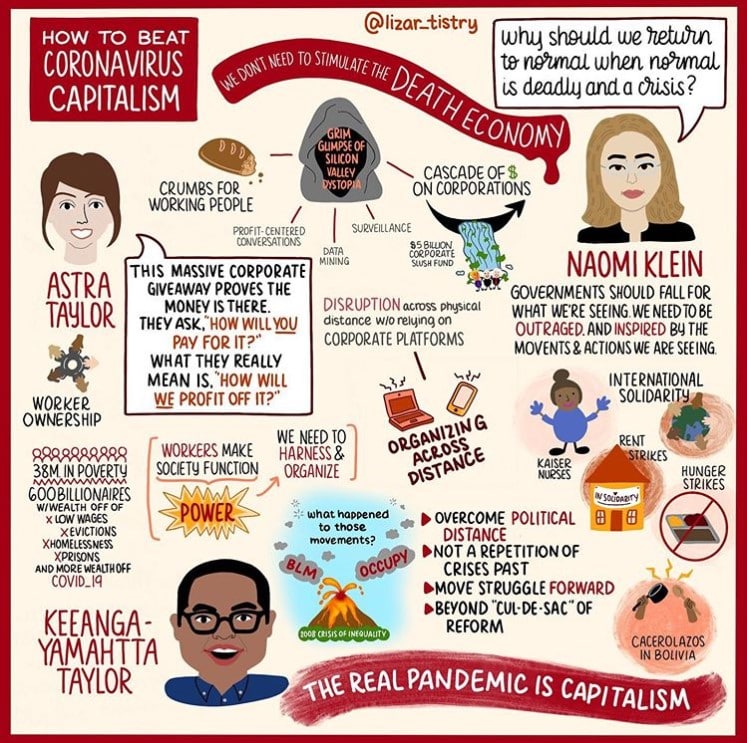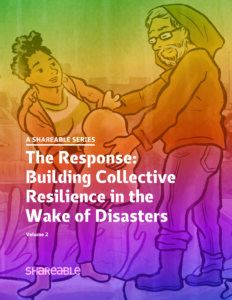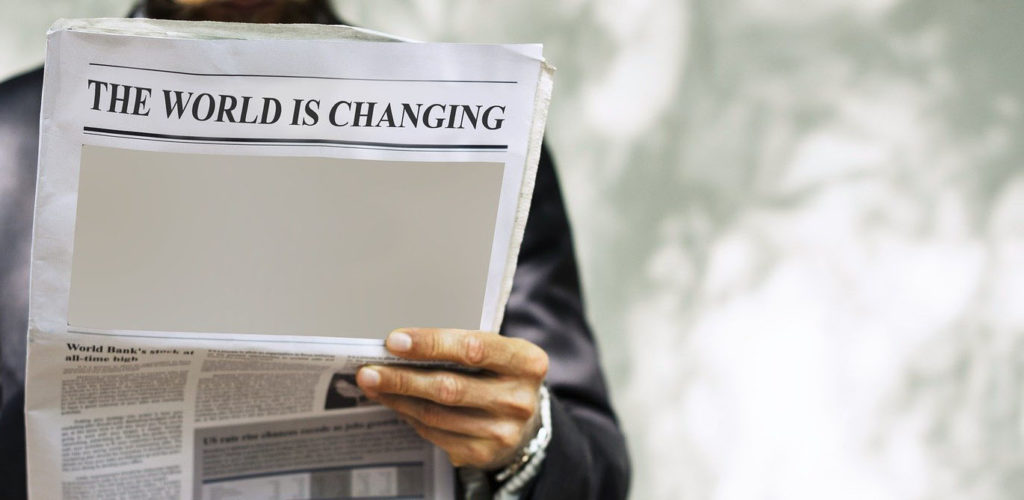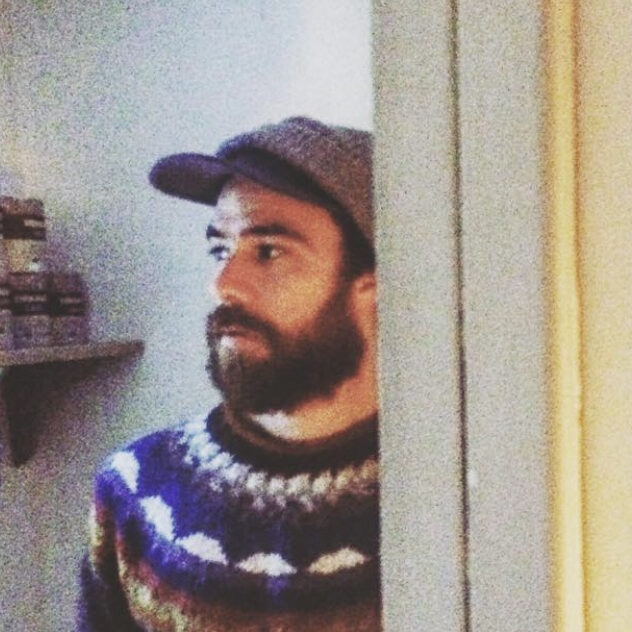Early last week, when Republican Lt. Gov. of Texas, Dan Patrick, suggested that the elderly should be willing to die from COVID-19 to get the economy back in action, something major shifted. If just briefly, the mask came off. Here was an elected official explicitly offering human sacrifices to appease the market.
Texas Lt Gov Dan Patrick went on national tv & argued elderly people should die for the health of the market. Capitalism is a system that priorities profits over people. This fight is literally a matter of life or death. Battle lines are being drawn. Which side are you on? pic.twitter.com/GI3LQZG7uo
— Chris Brooks (@chactivist) March 24, 2020
“Capitalism has always been willing to sacrifice life,” author and activist Naomi Klein told an audience of 14,000 people last week on an online teach-in hosted by Haymarket Books. “[It’s an] economic model soaked in blood. This is not a more radical version of capitalism; what is more radical is the scale.”
It’s unfortunate that it’s taking a global pandemic to reveal it, but the unprecedented crisis catalyzed by the coronavirus has exposed our capitalist economic system for what it has always been. From the early history of colonialism, slavery, the enclosure of the commons to the ravages of industrial capitalism, and into modern austerity regimes, capitalism has always put profit over people.
This is exactly why any calls for “returning to normal” are so misguided. “Normal is deadly, normal was a massive crisis,” Klein emphasized last week. “We don’t need to stimulate the death economy, we need to catalyze a massive transformation into an economy that is based on protecting life.”
In 2007, Klein presented her thesis of disaster capitalism to the world in her groundbreaking book, “The Shock Doctrine.” Her ideas seemed to perfectly explain much of what was — and still is — taking place globally. The thesis is fairly simple: When a crisis unfolds, disaster capitalists will try to create an opportunity to advance their nefarious agendas. One obvious example of this is the stimulus bill signed into law late last week which showers trillions of dollars onto Wall Street and giant corporations with minimal oversight or regulation. Nothing suggests a “return to normal” more than another corporate bailout that will never “trickle-down” to the rest of us.
Instead, what Klein and others demand is a bottom-up bailout that goes well beyond simply surviving this acute crisis. Throughout the teach-in, Klein and her co-panelists Astra Taylor and Keeanga-Yamahtta Taylor, offered a variety of solutions that could be applied to both the short- and long-term crises of the coronavirus and capitalism — both relief and recovery. An example of immediate relief would be a moratorium on rent until the crisis is over, while an example of recovery would be passing policies that would guarantee affordable housing to everybody living in the United States. The former is a stopgap measure to mitigate immediate harm; the latter is systemic transformation.
Part of the economic recovery package which just passed congress includes a one-time payment of $1,200 to individuals making less than $75,000 annually. There has been quite a bit of criticism coming from many different communities suggesting the figure of $1,200 is too low. The number was likely derived from the federal minimum wage wherein a full-time worker making $7.25/hr grosses $1,160 per month. Rounded up, this explains the $1,200 figure that the Republicans and Democrats agreed upon.
If we utilize the framing encouraged by Klein and others we can begin to see how the coronavirus pandemic simply reveals the more chronic disaster that is the Federal minimum wage. If $1,200 is not enough in an acute crisis, then it’s certainly not enough during “normal” times.
Of course, affordable housing and an increase in the minimum wage are not new ideas. In fact, many of the structural policy proposals put forth by Klein and her co-panelists are ideas that have been on the agenda of the left for quite some time. “We need to reimagine in this moment,” Klein argued. “And the good news is that we aren’t starting from scratch.”
Policy proposals like the Green New Deal, universal health care, universal basic income, and labor protections such as raising the minimum wage to $15/hr and democratizing the economy, for example, have all — as Klein puts it — been “lying around” for quite some time. She borrows this phrase from the economist Milton Friedman, who argued that radical transformation can only take place during periods of acute crisis. It’s during these periods that the ideas “already lying around” will step in to fill the gaps.
Friedman was an American right-wing economist whose ideas are largely responsible for the rise of neoliberalism and austerity politics that have shaped the last 40 years. He utilized a crisis in capitalism during the late 1970s to help usher in a sweeping transformation that ended the Keynesian, New Deal-era in the United States.
“The scale of the coronavirus crisis is so profound that there is now an opportunity to remake our society for the greater good, while rejecting the pernicious individualism that has left us utterly ill-equipped for the moment,” Keeanga-Yamahtta Taylor explained during the teach-in. “The class-driven hierarchy of our society will encourage the spread of this vicious virus, unless dramatic and previously unthinkable solutions are immediately put on the table.”
The coronavirus is an unprecedented event, but it’s the sharpening of class divides, the gutting of our social safety net and the mentality of selfish individualism encouraged by capitalism which have turned this pandemic into an unimaginable crisis.
Things like eviction moratoriums, stimulus checks, or extended unemployment benefits will not fundamentally address the conditions which allowed the coronavirus to unfold so disastrously. They also won’t address the many chronic disasters that plague capitalist society on a daily basis. As Klein and others argue, these things can only be addressed through radical, systemic transformation.

##
This article is part of our reporting on The People’s COVID-19 Response. Here are a few articles from the series:
- Coronavirus catalyzes growing wave of grassroots action despite social distancing
- The coronavirus pandemic calls us to share more than ever
- The People’s COVID-19 Response needs you
- 10 ways to share during the COVID-19 pandemic
- The pandemic isn’t a portal, yet
- The Response: Resisting COVID-19 with mutual aid in Chico, CA
- 20 ways Shareable readers are helping during the pandemic
 |
Download our free ebook- The Response: Building Collective Resilience in the Wake of Disasters (2019) |









